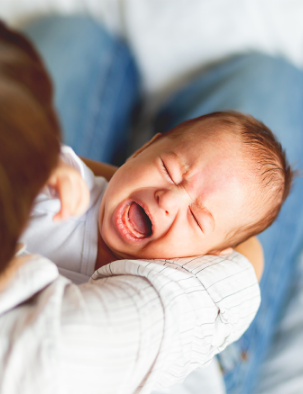Surviving as a Family
A baby that cries a lot affects everyone.
Brothers and sisters are affected
Second and later-born children are just as likely to be high criers as first-born children, and a crying baby can impact on older siblings as well as parents. For some parents juggling the needs of an older child with those of a crying baby can be very hard. An older child still needs a parent’s time, but getting the balance right can be hard and does leave some parents feeling guilty.
We do not know of any specific evidence on the impact a crying baby has on older children. However, research into the effects of a new baby on older siblings in general does offer some clues:
- With a new baby, it is difficult to avoid reducing the time you can spend with existing children. That’s likely to be worse with a baby that cries a lot.
- One way to reduce the effect of a crying baby is to share the care of the children with your partner, a family member or a trusted friend. Asking someone you trust to look after the baby for a while will free you up to spend some quality one-to-one time with your older child or children. Planning to do things together can help older children feel important and loved.
- Depending on their age, children may be alarmed by the baby’s crying and need reassurance. Older children may even begin to resent their new sibling.
- If your child is old enough, try explaining that all babies cry, that some do so more than others, and that your baby is well and will grow out of the crying. This may reassure them.
- If your child is old enough, involving them in the care of your baby may help. For example ask them to help at bath time, give them a job to do at feeding time or ask them to sing to the baby. Involving older children with your baby’s care at times when the baby is not crying may help them to bond.
If you have a crying baby and older children, it is harder for you to make time for yourself but it is just as important. Being exhausted will not help you or your children. Do try not to feel guilty about taking a little time out when you can get it.
All kinds of families are affected
Crying babies affect all families. Most research focuses on heterosexual parents but the information and advice on this website probably applies just as much to single parents and same-sex parents. If you are a single parent, you may want to find a trusted friend or family member who can support you and who you can share the information on the website with.
Having a crying infant puts great strain on relationships
Research shows that trying to deal with the demands of a crying baby puts a big strain on relationships. When parents are tired and stressed by their crying baby and there seems to be little relief in sight, they do not always make the best company! Everybody handles things differently so it is not safe to assume your partner is thinking in the same way as you. Try to listen and understand each other. Good communication will help you work together better as a team and reduce your stress. Discussing the information on this website may help you find coping tips you could try together.


